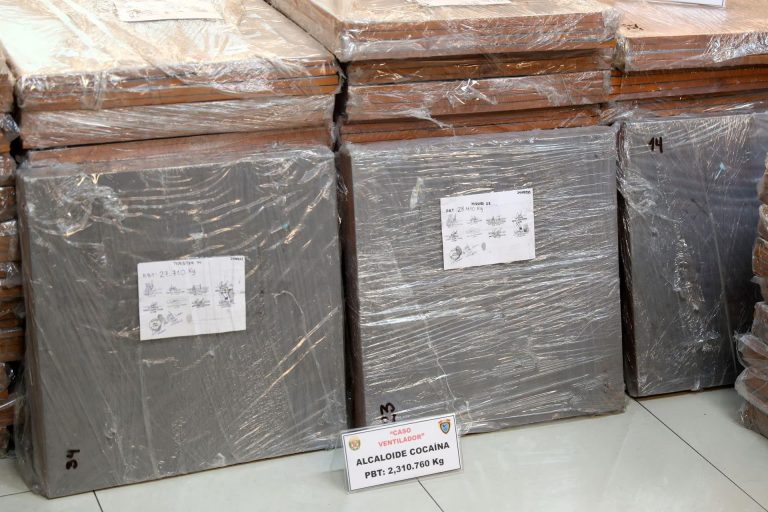Law enforcement authorities in Peru said this week that they seized more than two tons of cocaine that was bound for Turkey.
Reuters reports that the “drug bust happened Friday at a warehouse at Peru’s biggest port, El Callao, just outside the capital Lima.”
“This is the first incident that we know of (in which the cargo was in) Peruvian ports and its final destination was Turkey. Usually we are aware of ports in Belgium, the Netherlands, Spain and France,” said El Callao’s police chief, Colonel Luis Angel Bolanos, as quoted by Reuters.
According to Reuters, police “displayed the cocaine, which had been fixed to rubber sheets to appear as hundreds of ceramic tiles packed in wooden boxes inside a shipping container” during a press conference on Monday.
The news service reported that “Bolanos said the seized cocaine was valued at ‘at least $20 million.’”
“The Andean nation seized a record 86.4 tonnes of drugs and illicit substances last year, 28 tonnes of which were cocaine hydrochloride, police data shows,” according to Reuters. “Peru and nearby Colombia are among the top global producers of cocaine and of the coca leaf it is made of, according to the United Nations. Production in Peru has been mostly growing along the border with Brazil in the Ucayali region, where coca leaf crops have almost sextupled in size in two years to 10,229 hectares (25,276 acres) in 2021, according to Peruvian authorities.”
Last year, the White House released a report on cocaine production in South America, including Peru.
“The United States recognizes the Government of Peru’s commitment to reduce coca cultivation and cocaine production. Estimated coca cultivation and cocaine production in Peru decreased but remained high at 84,400 hectares and 785 metric tons, respectively. The current level of coca cultivation highlights the importance of returning to pre-pandemic levels of eradication, while investing in a holistic approach that seeks to bring safety, security, and opportunity to rural Peruvians,” the White House said.
“The Biden-Harris Administration is committed to continuing close cooperation with our partners in South America to address our shared challenge of drug production, trafficking and use,” said Dr. Rahul Gupta, the director of the White House Office of National Drug Control Policy. “As part of President Biden’s National Drug Control Strategy, we are pursuing policies that expand access to the continuum of care for substance use, go after drug traffickers and their profits, and also address the root causes of participation in the illicit economy in coca-growing areas, such as poverty, insecurity, and the lack of access to services.”
Turkey, meanwhile, “has become a global trafficking hub for South American cocaine, fuelling rising demand for the drug in Eastern Europe and the Persian Gulf, according to organised crime experts,” Vice reported last year.
“A two-part analysis by InSight Crime, an investigative organisation, published today and last week reveals that gangs in Turkey, a country notorious for its major role in heroin trafficking between Afghanistan to Europe, now have major interests in the cocaine trade,” according to Vice, which said that Turkey’s increased involvement in the trade came “when South American cocaine producers needed a new route eastwards for their product, as so much of it was being seized going into western Europe.”
“Turkish gangs were attracted to the cocaine business due to their maritime expertise, diminishing profits from heroin due falling wholesale prices, a growing demand for cocaine in badly supplied parts of eastern Europe and the Middle East, and closer links between Turkish criminals – including the far-right Grey Wolves – and cartels in Latin America,” Vice reported. “As a result, Turkish traffickers have become key players supplying South American cocaine to emerging markets in Russia, the Balkans and a new desert cocaine route through northern Iraq into the Persian Gulf, according to the research.”
